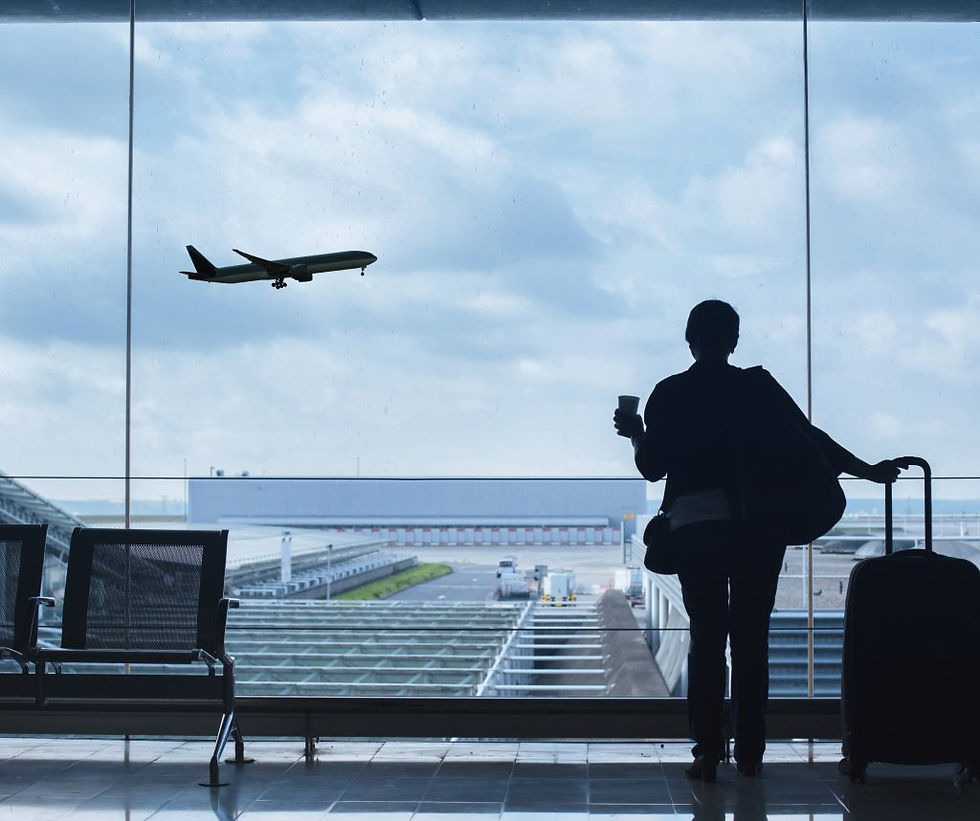Antimicrobial Innovations Shaping the Future of Travel Safety
- Hassan Soukar

- Nov 30, 2024
- 3 min read
Travel has always captivated us—the excitement of exploring new places, immersing ourselves in unique cultures or jetting to that next work event. However, this thrilling experience often comes with a significant downside: an increased risk of illness. Airports, aeroplanes, cruise ships, and public transportation hubs—like trains and subways—are notorious hotspots for transmitting harmful bacteria and viruses.

The close quarters and shared surfaces in these environments create ideal breeding grounds for germs. While common ailments like colds and stomach viruses can spread quickly, more severe pathogens such as MRSA and influenza and recent threats like SARS-CoV-2 underscore the urgent need for advanced preventative measures in travel.
Emerging Technologies Transforming the Travel Sector
Antimicrobial Nitrile Gloves
Antimicrobial nitrile gloves are becoming essential for staff at airports, airlines, and cruise ships. Companies like Unigloves are leading the change with their CrossGuard gloves, which eliminate 99.99% of selected bacteria in just 60 seconds.
This innovative technology significantly reduces the risk of transmitting harmful pathogens in the travel sector during baggage handling, food preparation, and security screenings, ensuring a safer experience for staff and travellers.
Bio-Burden Reducing Plastics and Textiles
High-touch surfaces in travel settings, such as handrails, elevator buttons, countertops, and seating, pose a considerable risk for germ transmission. Antimicrobial integrated plastics provide a long-lasting solution by reducing bioburden on these surfaces.
These innovative materials prevent bacteria from growing on the surface, reducing the transfer of pathogens in spaces like airport lounges, cruise ship corridors, and aeroplane lavatories.
Similarly, textiles like aeroplane seats, cruise ship bedding, and staff uniforms can harbour bacteria and viruses. Antimicrobial organic and synthetic fabrics are being developed to address this issue. These textiles not only help prevent the spread of germs but also minimize odours by killing odour-causing bacteria.
For instance, KluraLabs has introduced a safe and sustainable bio-burden-reducing plastic free from heavy metals. Their bio-based textile formulation achieves a remarkable 5.9-log reduction in Staphylococcus epidermidis after 50 washes (99.999%), ensuring long-lasting hygiene.
HEPA and Antimicrobial Air Filtration
Air quality plays a crucial role in controlling the spread of illnesses, especially in enclosed environments like aeroplanes and cruise ships. HEPA (High-Efficiency Particulate Air) filters are renowned for trapping airborne particles, but recent advancements have integrated antimicrobial properties that actively neutralize harmful pathogens.
These advanced filtration systems can capture bacteria, viruses, and mould spores, significantly reducing the risk of airborne transmission while travelling.
Airlines like Qatar Airways have implemented cutting-edge HEPA filtration systems that remove an impressive 99.997% of viral and bacterial contaminants from the air, offering passengers an extra layer of protection.
Safe and Sustainable Antimicrobial Solutions
While antimicrobial technologies are vital for illness prevention, it is paramount to ensure they are environmentally friendly. Traditional antimicrobial materials often rely on heavy metals like silver or copper, which can harm ecosystems.
Thankfully, safe, sustainable, non-heavy-metal-based antimicrobial solutions are emerging. These include biobased ingredients that break down naturally, minimizing environmental impact, and non-active ingredient solutions suitable for applications such as gloves used in hospitals and food handling.
Dr. Masoomeh Bazzar who worked on the CrossGuard glove technology says: “The challenge was to create an antimicrobial glove free from active ingredients. By adjusting the ratios of conventional nitrile glove ingredients, we’ve created a solution that is not only safe but also highly effective”.
A Safer and More Responsible Future for Travel
As we look toward the future of travel, the health and safety of passengers and workers must remain a top priority. Emerging technologies in antimicrobial gloves, plastics, textiles, and air filtration are critical in creating safer travel environments.
Moreover, the industry’s shift toward sustainable, non-toxic solutions ensures a reduced environmental footprint while effectively combating illness transmission. With innovations like these on the horizon, the future of travel is healthier and more responsible.













Ücretsiz rastgele yetişkin sohbet cinsel sohbet gabile sohbet sorunsuz yeni kişilerle tanışma imkanı sağlar.
Ücretsiz rastgele yetişkin chat gabile chat cinsel chat kesintisiz arkadaşlık yeni kişilerle tanışma imkanı sağlar.